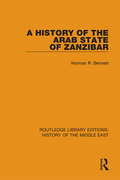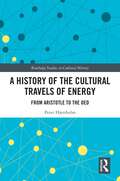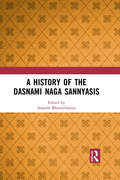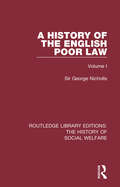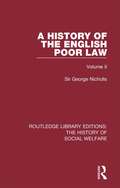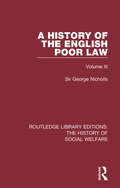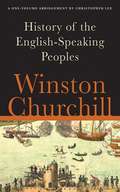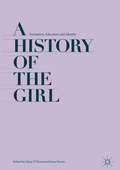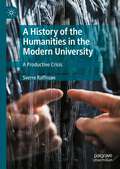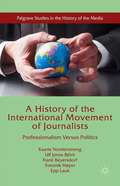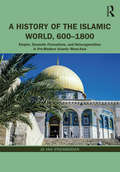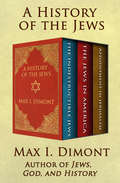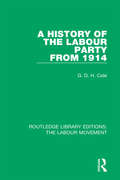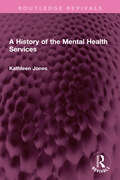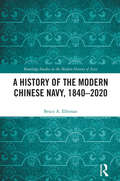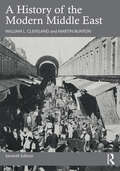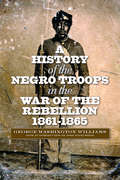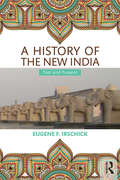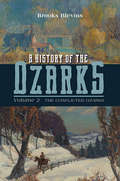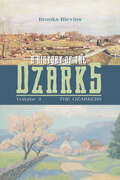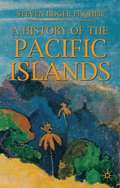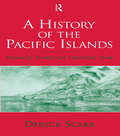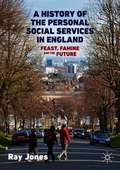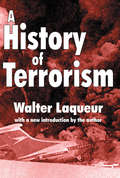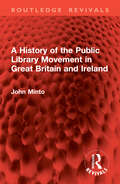- Table View
- List View
A History of the Arab State of Zanzibar (Routledge Library Editions: History of the Middle East #7)
by Norman R. BennettDuring the late eighteenth and early nineteenth centuries the fertile islands of Zanzibar and Pemba became of central importance to East Africa’s growing contact with the international economy as the ruling dynasty encouraged trade in cloves, slaves and ivory. This book, first published in 1978, provides an account of the history of Zanzibar from those early days of trade up to independence and the Revolution that removed the Arab ruling class in 1964.
A History of the Cultural Travels of Energy: From Aristotle to the OED (Routledge Studies in Cultural History)
by Peter HjertholmThis book offers a cultural history of the travels of energy in the English language, from its origins in Aristotle’s ontology, where it referred to the activity-of-being, through its English usage as a way to speak about the inherent nature of things, to its adoption as a name for the mechanics of motion (capacity for work). A distinguished literature deals with energy as matter of science history. But this literature fails to adequately answer a historical question about the rise of the science of energy: How did the commonplace word ‘energy’ end up becoming a concept in science? This account differs in important ways from the history of the word in the Oxford English Dictionary. Discovering the origins and early travels of energy is essential for understanding how the word was borrowed into physics, and therefore a cultural history of energy is a necessary companion to the science history of the term. It is important that modern scholars in a variety of fields be aware that energy did not always have a scientific content. The absence of that awareness can lead to, have led to, anachronistic interpretations of energy in historical sources from before the 1860s. A History of the Cultural Travels of Energy will be useful for those interested in the history of science and technology, cultural history, and linguistics.
A History of the Dasnami Naga Sannyasis
by Ananda BhattacharyyaOrganized Naga military activity originally flourished under state patronage. During the latter half of the sixteenth century and the early part of the seventeenth century, a number of bands of fighting ascetics formed into akharas with sectarian names and identities.The Dasnami Sannyasis constitute perhaps the most powerful monastic order which has played an important part in the history of India. The cult of the naked Nagas has a long history. The present volume aims to explore new findings which are available in various archives and repositories in order to fill up the lacuna in Jadunath Sarkar’s work on the subject as elaborated in the present introduction. Please note: Taylor & Francis does not sell or distribute the Hardback in India, Pakistan, Nepal, Bhutan, Bangladesh and Sri Lanka.
A History of the English Poor Law: Volume I (Routledge Library Editions: The History of Social Welfare #13)
by Sir George NichollsFirst published in 1854, this comprehensive work charts over three volumes the history of poor relief in England from the Saxon period through to the establishment of the Poor Law Amendment Act in 1834 and its reception. This edition, updated in 1898, also includes a biography of the author, Sir George Nicholls. Volume I examines poor relief from the Saxon period to the reign of Queen Anne. This set of books will be of interest to those studying the history of the British welfare state and social policy.
A History of the English Poor Law: Volume II (Routledge Library Editions: The History of Social Welfare #13)
by Sir George NichollsFirst published in 1854, this comprehensive work charts over three volumes the history of poor relief in England from the Saxon period through to the establishment of the Poor Law Amendment Act in 1834 and its reception. This edition, updated in 1898, also includes a biography of the author, Sir George Nicholls. Volume I examines poor relief from the accession of George I to 1854. This set of books will be of interest to those studying the history of the British welfare state and social policy.
A History of the English Poor Law: Volume III (Routledge Library Editions: The History of Social Welfare #13)
by Sir George NichollsFirst published in 1854, this comprehensive work charts over three volumes the history of poor relief in England from the Saxon period through to the establishment of the Poor Law Amendment Act in 1834 and its reception. This edition, updated in 1898, also includes a biography of the author, Sir George Nicholls. Volume III examines poor relief from 1834 to 1898. This set of books will be of interest to those studying the history of the British welfare state and social policy.
A History of the English-Speaking Peoples
by Winston ChurchillAn authoritative survey of the history of English-speaking peoples throughout the world combines intriguing, closely observed biographical profiles--of Alfred the Great, Victoria, Joan of Arc, Lincoln, and other notables--with an account of the key events and issues of the era. The narrative commences fifty-five years before the birth of Christ, when Julius Caesar famously "turned his gaze upon Britain,” and concludes in the year 1900. The beginnings of Parliament, the Church, and the monarchy are all analyzed alongside this comprehensive abridgment.
A History of the Girl: Formation, Education And Identity
by June Purvis Mary O'DowdThis book is centered on the history of the girl from the medieval period through to the early twenty-first century. Authored by an international team of scholars, the volume explores the transition from adolescent girlhood to young womanhood, the formation and education of girls in the home and in school, and paid work undertaken by girls in different parts of the world and at different times. It highlights the value of a comparative approach to the history of the girl, as the contributors point to shared attitudes to girlhood and the similarity of the experiences of girls in workplaces across the world. Contributions to the volume also emphasise the central role of girls in the global economy, from their participation in the textile industry in the eighteenth century, through to the migration of girls to urban centres in twentieth-century Africa and China.
A History of the Humanities in the Modern University: A Productive Crisis
by Sverre RaffnsøeThis book challenges commonplace assertions that the humanities are presently undergoing a severe crisis as a result of a longstanding decline. Rather than hearkening to the widespread, reactive call for a last-ditch defense of the humanities under attack from an ungracious world, this book fundamentally reverses the perspective and makes a plea for a different, affirmative approach. It contends that the humanities have incessantly arrived at critical turning points since they were first constituted in a form that remains recognizable today and assumed a leading role in knowledge organization with the establishment of the modern university around 1800. Assuming a historical perspective, the monograph takes the human sciences back to their rightful place in the family tree of sciences and gives due recognition to their continuously decisive role in the production of new knowledge and the creation of new fields of knowledge. Situating the ongoing gemmation of the humanities in a broader context, this monograph also offers an encompassing introduction to the over-all development of knowledge in the last two hundred years.
A History of the International Movement of Journalists: Professionalism Versus Politics (Palgrave Studies in the History of the Media)
by Kaarle Nordenstreng Frank Beyersdorf Svennik H�yer Epp Lauk Ulf BjrkThis study presents a general history of how journalism as an emerging profession became internationally organized over the past one hundred and twenty years, seen mainly through the associations founded to promote the interests of journalists around the world.
A History of the Islamic World, 600-1800: Empire, Dynastic Formations, and Heterogeneities in Pre-Modern Islamic West-Asia
by Jo Van SteenbergenA History of the Islamic World, 600–1800 supplies a fresh and unique survey of the formation of the Islamic world and the key developments that characterize this broad region’s history from late antiquity up to the beginning of the modern era. Containing two chronological parts and fourteen chapters, this impressive overview explains how different tides in Islamic history washed ashore diverse sets of leadership groups, multiple practices of power and authority, and dynamic imperial and dynastic discourses in a theocratic age. A text that transcends many of today’s popular stereotypes of the premodern Islamic past, the volume takes a holistically and theoretically informed approach for understanding, interpreting, and teaching premodern history of Islamic West-Asia. Jo Van Steenbergen identifies the Asian connectedness of the sociocultural landscapes between the Nile in the southwest to the Bosporus in the northwest, and the Oxus (Amu Darya) and Jaxartes (Syr Darya) in the northeast to the Indus in the southeast. This abundantly illustrated book also offers maps and dynastic tables, enabling students to gain an informed understanding of this broad region of the world. This book is an essential text for undergraduate classes on Islamic History, Medieval and Early Modern History, Middle East Studies, and Religious History.
A History of the Jews: The Indestructible Jews, The Jews in America, and Appointment in Jerusalem
by Max I. DimontThree books on Jewish heritage from the author of Jews, God, and History, &“the best popular history of the Jews written in the English language&” (Los Angeles Times). With over a million and a half copies sold, Jews, God and History introduced readers to &“the fascinating reasoning&” of acclaimed scholar Max I. Dimont&’s &“bright and unorthodox mind&” (San Francisco Sunday Examiner and Chronicle). In these three volumes, Dimont builds on the themes and insights presented in that seminal work, providing a rich and comprehensive portrait of the cultural and religious history of the Jewish people. The Indestructible Jews traces the four-thousand-year journey of the Jewish people from an ancient tribe with a simple faith to a global religion with adherents in every nation. Through countless expulsions and migrations, the great tragedy of the Holocaust and the joy of founding a homeland in Israel, this compelling history evokes a proud heritage while offering a hopeful vision of the future. The Jews in America offers an overview of Judaism in the United States from colonial times to twentieth-century Zionism. Dimont follows the various waves of immigration, recounts the cultural achievements of those who escaped oppression in their native lands, and discusses the attitudes of American Jews—both religious and secular—toward Israel. Appointment in Jerusalem explores the mystery surrounding the predictions Jesus made about his fate. Dimont re-creates the drama in three acts using his knowledge of the events recorded in the Bible. Thoughtful and fascinating, his account offers fresh insights into questions that have surrounded religion for centuries. Who was Jesus—the Christian messiah or a member of a Jewish sect?
A History of the Labour Party from 1914 (Routledge Library Editions: The Labour Movement #5)
by G. D. ColeFirst published in 1948, this book gives a full account of the development of the British Labour Party from its emergence as a national influence in the first world war to its return to power with an effective majority after the second world war. The study includes an epilogue which surveys the achievements of the party in the years after the 1945 election. This title will be of interest to scholars and students of history and politics.
A History of the Mental Health Services: A Revised History Of The Mental Health Services - From The Early 18th Century To The 1990s (Routledge Revivals)
by Kathleen JonesFirst published in 1972, A History of the Mental Health Services is a revised and abridged version of both Lunacy, Law and Conscience and Mental Health and Social Policy, rewriting the material from the end of the Second World War to the passing of the Mental Health Act 1959, and adding a new section which runs from 1959 to the Social Services Act 1970. The story starts with the first legislative mention of the ‘furiously and dangerously mad’ as a class for whom some treatment should be provided, traces the development of reform and experiment in the nineteenth century, and the creation of the asylum system, and ends in the age of Goffman and Laing and Szasz with the virtual disappearance of the system. The book will be of interest to students of mental health, sociology, social policy, health policy and law.
A History of the Modern Chinese Navy, 1840–2020 (Routledge Studies in the Modern History of Asia)
by Bruce A. EllemanThis book provides a comprehensive history of the modern Chinese navy from 1840 to the present. Beginning with a survey of naval developments in earlier imperial times, the book goes on to show how China has since the mid-19th century four times built or rebuilt its navy: after the Opium Wars, a navy which was sunk or captured by the Japanese in the war of 1894–1895; during the 1920s and 1930s, a navy again sunk or lost to Japan, in the war of 1937–1945; in the 1950s, a navy built with Soviet help, which stagnated following the Sino-Soviet split in the early 1960s; and finally the present navy which absorbed its predecessor, but with the most modern sections dating from the 1990s—a navy which continues to grow and prosper. The book also shows how the underlying strategic imperative for the Chinese navy has been the defense of China’s coasts and major rivers; how naval mutiny was a key factor in the overthrow of the Qing and the Nationalist regimes; and how successive Chinese governments, aware of the potent threat of naval mutiny, have restricted the growth, independence, and capabilities of the navy. Overall, the book provides—at a time when many people in the West view China and its navy as a threat—a rich, detailed, and realistic assessment of the true nature of the Chinese navy and the contemporary factors that affect its development.
A History of the Modern Middle East
by William L. Cleveland Martin BuntonA History of the Modern Middle East examines the profound and often dramatic transformations of the region in the past two centuries, from the Ottoman and Egyptian reforms, through the challenge of Western imperialism, to the impact of US foreign policies. Built around a framework of political history, while also carefully integrating social, cultural, and economic developments, this expertly crafted account provides readers with the most comprehensive, balanced, and penetrating analysis of the modern Middle East.The seventh edition has been substantially revised to reflect the significance of the 2011 Arab Uprisings as a major turning point in the modern history of the region. A new chapter considers how regional powers, especially in the Gulf, are now asserting themselves more forcefully, seeking to push their own interests while Russia and China contest America’s position. Including an annotated and updated bibliography that offers guidance to readers seeking more in-depth information and incorporating an online companion website featuring quizzes, timelines, and instructor resources, A History of the Modern Middle East remains the quintessential text for courses on Middle Eastern history.
A History of the Negro Troops in the War of the Rebellion, 1861-1865
by John David Smith George Washington WilliamsA History of the Negro Troops in the War of the Rebellion, 1861–1865 (originally published in 1888) by pioneer African American historian George Washington Williams remains a classic text in African American literature and Civil War history. In this powerful narrative, Williams, who served in the U.S. Colored Troops, tells the battle experiences of the almost 200,000 black men who fought for the Union cause. Determined to document the contributions of his fellow black soldiers and to underscore the valor and manhood of his race, Williams gathered his material from the official records of U.S. and foreign governments and from the orderly books and personal recollections of officers commanding Negro troops during the American Civil War. <p><p> The new edition of this important text includes an introductory essay by the award-winning historian John David Smith. In his essay, Smith narrates and evaluates the book’s contents, analyzes its reception by contemporary critics, and evaluates Williams’s work within the context of its day and its place in current historiography.
A History of the New India: Past and Present
by Eugene F. IrschickProviding a different approach to the history of India than previously advocated, this textbook argues that there was constant interaction between peoples and cultures. This interactive, dialogic approach provides a clear understanding of how power and social relations operated in South Asia. Covering the history of India from Mughal times to the first years of Independence, the book consists of chapters divided roughly between political and thematic questions. Topics discussed include: Mughal warfare and military developments The construction of Indian culture Indian, regional and local political articulation India’s Independence and the end of British Rule Women and governmentality The rise of the Dalit movement As well as a detailed timeline that provides a useful overview of key events in the history of India, a set of background reading is included after each chapter for readers who wish to go beyond the remit of this text. Written in an accessible, narrative style, the textbook will be suitable in courses on Indian and South Asian history, as well as courses on world history and South Asian studies.
A History of the Ozarks, Volume 2: The Conflicted Ozarks
by Brooks BlevinsThe Ozarks of the mid-1800s was a land of divisions. The uplands and its people inhabited a geographic and cultural borderland straddling Midwest and west, North and South, frontier and civilization, and secessionist and Unionist. As civil war raged across the region, neighbor turned against neighbor, unleashing a generation of animus and violence that lasted long after 1865.The second volume of Brooks Blevins's history begins with the region's distinctive relationship to slavery. Largely unsuitable for plantation farming, the Ozarks used enslaved persons on a smaller scale or, in some places, not at all. Blevins moves on to the devastating Civil War years where the dehumanizing, personal nature of Ozark conflict was made uglier by the predations of marching armies and criminal gangs. Blending personal stories with a wide narrative scope, he examines how civilians and soldiers alike experienced the war, from brutal partisan warfare to ill-advised refugee policies to women's struggles to safeguard farms and stay alive in an atmosphere of constant danger. The war stunted the region's growth, delaying the development of Ozarks society and the processes of physical, economic, and social reconstruction. More and more, striving uplanders dedicated to modernization fought an image of the Ozarks as a land of mountaineers and hillbillies hostile to the idea of progress. Yet the dawn of the twentieth century saw the uplands emerge as an increasingly uniform culture forged, for better and worse, in the tumult of a conflicted era.
A History of the Ozarks, Volume 3: The Ozarkers
by Brooks BlevinsBetween the world wars, America embraced an image of the Ozarks as a remote land of hills and hollers. The popular imagination stereotyped Ozarkers as ridge runners, hillbillies, and pioneers—a cast of colorful throwbacks hostile to change. But the real Ozarks reflected a more complex reality. Brooks Blevins tells the cultural history of the Ozarks as a regional variation of an American story. As he shows, the experiences of the Ozarkers have not diverged from the currents of mainstream life as sharply or consistently as the mythmakers would have it. If much of the region seemed to trail behind by a generation, the time lag was rooted more in poverty and geographic barriers than a conscious rejection of the modern world and its progressive spirit. In fact, the minority who clung to the old days seemed exotic largely because their anachronistic ways clashed against the backdrop of the evolving region around them. Blevins explores how these people’s disproportionate influence affected the creation of the idea of the Ozarks, and reveals the truer idea that exists at the intersection of myth and reality. The conclusion to the acclaimed trilogy, The History of the Ozarks, Volume 3: The Ozarkers offers an authoritative appraisal of the modern Ozarks and its people.
A History of the Pacific Islands
by Steven Roger FischerFrom the back cover: This wide-ranging study of the Pacific Islands provides a dynamic and provacative account of the peopling of the Pacific, and its broad impact on world history. Spanning nearly 50,000 years of human presence in an area which comprises one-third of our planet - Melanesia, Micronesia and Polynesia - the narrative follows the development of the region, from New Guinea's earliest settlement to the creation of the modern Pacific states.
A History of the Pacific Islands: Passages through Tropical Time
by Deryck ScarrA book about the past and present Pacific Islands, wide-ranging in time and space spanning the centuries from the first settlement of the islands until the present day.
A History of the Personal Social Services in England: Feast, Famine and the Future
by Ray JonesThis book provides a detailed narrative and analysis of the 50-year development of the personal social services in England, located throughout the changing ideological, political and relevant professional contexts of the period. Drawing on the experience and recollections of key players who were active during major moments, it constitutes a significant addition to the social work and social policy literature, synthesising important and often original evidence, and some provocative interpretations. The book speaks to crucial on-going issues and contentious current debates, such as the place of bureaucratic management structures in ‘practices with people' generally, and social work specifically. It will be of interest to student and qualified social workers, social policy students and researchers, and policy makers, as well as those with a general interest in the history and trajectory of current issues facing social work and social care in England.
A History of the Polish Americans: A History Of The Polish-americans (Minorities In Modern America Ser.)
by John.J. BukowczykIn the last, rootless decade families, neighborhoods, and communities have disintegrated in the face of gripping social, economic, and technological changes. Th is process has had mixed results. On the positive side, it has produced a mobile, volatile, and dynamic society in the United States that is perhaps more open, just, and creative than ever before. On the negative side, it has dissolved the glue that bound our society together and has destroyed many of the myths, symbols, values, and beliefs that provided social direction and purpose. In A History of the Polish Americans, John J. Bukowczyk provides a thorough account of the Polish experience in America and how some cultural bonds loosened, as well as the ways in which others persisted.
A History of the Public Library Movement in Great Britain and Ireland (Routledge Revivals)
by John MintoOriginally published in 1932, A History of the Public Library Movement in Great Britain and Ireland is concerned with the rise and progress of the public library as it stood at that time. The establishment and growth of the public library may be viewed as part of the great social movement for the spread of knowledge among the poorer classes which took place in the late eighteenth century and the early years of the nineteenth century. This movement was characterized by the establishment of various educational agencies, which are covered in this book, along with the introduction of the Public Libraries Act passed in 1850 and other legislation that followed.
